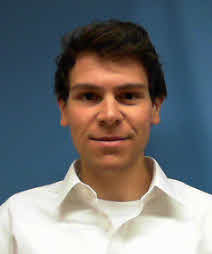Student Profile

Michael Mattioli
Engineer , Citadel
Class of 2021
“The part of me that had said for years ‘I’m never going back to school’ was now reasoning ‘it’s only 12 months, it’ll be a great way to network/meet people…. MSCRS program has helped me grow and accelerate my career and profile externally.”
See HERE to learn about Michael’s involvement in Trusted Computing Group’s new Supply Chain Security work group.
Michael is proud to describe himself as a nerd/engineer, an identity he developed starting with his early fascination with gadgets, robotics and “other geeky things.” A New York City native, he majored in computer engineering at NYU’s Tandon School of Engineering, a curriculum that integrated hardware-focused engineering with software-focused computer science. That combination attracted Goldman Sachs, which hired him right out of school as a Principal Engineer in the Hardware Engineering team.
Supply Chain Security
Now a Goldman Sachs Vice President and Principal Engineer, leading the Hardware Engineering team, Michael is responsible for the design and engineering of the firm’s digital experiences and technologies, as well as the overall strategy and execution of hardware innovation both within the firm and, as a Senior Member of the industry-leading technical professional associations IEEE and ACM, the broader technology industry. He also co-chairs two other industry working groups, both focused on supply chain security.
After graduation Michael was convinced that he was done with academia: “I had zero intentions or thoughts of pursuing another degree.” But in the fall of 2019, he came across the MS CRS program and was intrigued. “The part of me that had said for years ‘I’m never going back to school’ was now reasoning ‘it’s only 12 months, it’ll be a great way to network/meet people.”
Given Michael’s GS responsibilities and his external professional activities, he explains that what’s impressed him about the MSCRS program is the window it’s provided into how regulation and the legal system in the US hang together. “Having a better understanding of the US legal system and how it’s connected to the various regulatory bodies that exist for various industries and sectors was very eye-opening.
Understanding How the US Legal System Works
“Working in a highly-regulated industry like financial services, I was already very familiar with many of the intricacies of regulation and how to map that to design principles for products and services that I engineer. However, there was always a looming question: Why is it this way? It’s not always 100% clear why regulation is what it is or how it came to be. By understanding how the US legal system works and how it’s connected, I had a better appreciation for why things are the way they are. It also gave me a huge appreciation for the state of regulation in the US as opposed to other countries. GS is a global institution so we have to deal with regulatory bodies all over the world.”
What’s more, because a lot of Michael’s work is industry-focused, where he works with other organizations to design and build products, services, and standards that are commercially viable, he believes the broader perspective he’s gained from the MSCRS program has added to his expertise and standing within that larger universe. “When going after markets at global scale, you have to think about more than just the technical aspects, you have to think about the various legal, operational, and regulatory constraints and factor those into your designs. When working with these other institutions, they have a deeper appreciation for my understanding of how these things play into their business decisions, so I would say that the MSCRS program has helped me grow and accelerate my career/profile externally.
“There’s definitely a good ROI; the difference it has made in my life/career is certainly measurable enough that I can honestly say that I’d do it all over again – hopefully without the pandemic next time!”
Note: this profile was written while Michael Mattioli was Vice President & Principal Engineer at Goldman Sachs.

